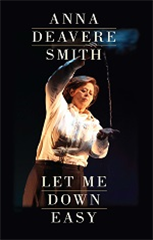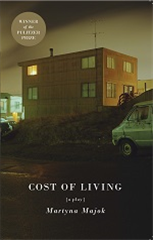- Book reviews by Kitty Drexel
(New York, NY/Somerville, MA) On occasion, the New England Theatre Geek will review newly published plays. Below are reviews for Pipeline by Dominique Morisseau, Let Me Down Easy by Anna Deavere Smith, and Cost of Living by Martyna Majok. All books are available via the TCG website.
Pipeline
Dominique Morisseau
TCG
Paperback
96pp
$14.95 USD
The full script of Pipeline was printed in the December 2017 issue of American Theatre magazine. Her playscript interview is HERE.
White people are killing Black people, and then blaming Black people for their own murders. Anyone seeking sources for this statement need only look to our own American history for confirmation. And by “history,” I mean the CNN news pages from last week, last month, last year, last decade, last century. Lincoln may have officially abolished slavery, but white folk have knowingly created a pipeline from our education system directly into the prison system, aka legalized slavery. Pipeline by Morisseau is about the unbearable burden Black people bear to prevent their own descent into the prison system.
Pipeline summary from TCG: “With profound compassion and lyricism, Morisseau brings us a powerful play that delves into the urgent issue of the “school-to-prison” pipeline that ensnares people of color. Issues of class, race, parenting, and education in America are brought to the frontlines, as we are left to question the systematic structures that ultimately trap underserved communities.”
Casting includes roles for 1 white woman in her mid-fifties, 1 adult Black woman, and 1 teenager of color. 3 Black men within their are needed. Omari is a teenager, the others are adult men. Nya, the protagonist, is a heavy role that requires great depth and stamina. She’s a woman fueled by anxiety and coffee. A single mother, Nya carries the weight of the world on her shoulders because she has to, not because she wants to. Performed by the right actor, this role will bring down houses.
Pipeline is the kind of play that New England theatres will infight for the rights to produce. These same professional theatres will cast outside of New England even though there are extremely talented Black actors who are also union living right here among them. They will do this because they can. When a play like Pipeline is suggesting within its pages that companies seek the actors they need within the local, already formed community, it’s shameful that casting agents do otherwise. Pipeline is about working to overlook the stringent contracts that determine failure before an attempt towards equity is made. Location doesn’t matter. Budgets don’t matter. What matters is stopping the elitist, racist practices before they start.
Dominique Morisseau’s work includes Ain’t Too Proud to Beg: The Life and Times of the Temptations; Sunset Baby; and The Detroit Project: a three-play cycle examining the sociopolitical history of Detroit, Morisseau’s hometown (Paradise Blue, Detroit ’69, and Skeleton Crew). She has been awarded the Steinberg Playwright Award, the Spirit of Detroit Award, a PoNY Fellowship, the Sky Cooper New American Play Prize, and two Obie Awards.
////
Let Me Down Easy
Anna Deavere Smith
TCG
PAPERBACK
96pp
$14.95 USD
PBS has a clip from the playwright’s televised performance. Her work is all over Youtube. Anna Deavere Smith a visionary.
Let Me Down Easy summary from TCG: “Compiled from dozens of interviews conducted by the author, Anna Deavere Smith’s Let Me Down Easy is a bracing, tender, melancholy, and triumphant exploration of death and dying. The speakers Smith inhabits include healthcare professionals, theologians, artists, athletes, and activists. They speak of the body as a battleground, a tool, a weapon, a joy, a burden. Smith’s great gift has always been her ability to break down her subjects’ defenses and present them in their full, complicated beauty. Whether channeling Lance Armstrong, Lauren Hutton, Peter Gomes, or others who are not in the public eye, Smith reminds us again and again that in learning to die we learn to live.”
A note from the playwright informs potential producers of this play that “…casts of any size, age group, or ethnicity will be able to perform this play.” She advises that directors cast out of type (not for comedic effect but for worldview), and that everyone understand that the monologues come from real people (emphasis mine). Each monologue is dated for dramaturgical purposes. All of the interviewees, with only few exceptions, are easily found via Google search.
Activists will be excited to know that buried between the monologues from famous people, there are golden nuggets of human experience. Pretty, rich people don’t frequently say things that are important unless caught off guard; they are taught by their PR teams to buck and weave between personal statements. Relatively not-famous people commited to greater works of goodness have the best stories even if their training isn’t in the art of telling.
The difficulty for the actor/s will be in making the less… complicated stories by noted famous personalities Lance Armstrong, and Lauren Hutton relatable. These monologues are tougher to decipher simply because these humans had lived such unattainable lives. Even playwright Eve Ensler, intense choreographer Elizabeth Streb, Buddhist Monk Matthieu Ricard, and Dr. Kiersta Kurtz-Burke (who worked in a hospital forgotten by George W. Bush, who doesn’t care about Black people, during Hurricane Katrina) are easier to decipher for their connections to the human experience. The monologues from bull rider Brent Williams, musicologist Susan Youens, and Lorraine Coleman (Smith’s auntie) are real dramatic treats for their unique character work.
Anna Deavere Smith is an acclaimed actress, playwright, author, and teacher. Smith rose to prominence with her verbatim theater pieces Fires in the Mirror and Twilight: Los Angeles 1992. She is also known for her performances in the films The American President, Philadelphia, and Rachel Getting Married, and her recurring roles on TV’s black-ish, The West Wing, and Nurse Jackie. Smith is the recipient of the MacArthur “Genius” Fellowship, two Tony nominations, and she was a finalist for the Pulitzer Prize in Drama. She received the 2012 National Humanities Award from President Obama.
////
Cost of Living
Martyna Majok
TCG
PAPERBACK
168pp
$14.95 USD
Summary from the TCG website: “Winner of the 2018 Pulitzer Prize for Drama, Cost of Living deftly challenges the typical perceptions of those living with disabilities and delves deep into the ways class, race, nationality, and wealth can create gulfs between people, even as they long for the ability to connect. Eddie, an unemployed truck driver, and his estranged ex-wife, Ani, find themselves unexpectedly reunited after a terrible accident leaves her quadriplegic. John, a brilliant PhD student with cerebral palsy, hires Jess, a first-generation recent graduate who has fallen on desperate times, as his new aide.”
There is a lot to unpack in Cost of Living. The first of which is that Majok allows her disabled characters to be people – angry, vulnerable, disrespectful, entitled, flawed people. They aren’t your textbook, cookie cutter, inspiration porn stories of gratitude and growth. Ani has trouble connecting with others. She pushes people away and doesn’t make up for the distance with redeeming quirks of character. She doesn’t want to be redeemed; she’s depressed. John is an entitled, overeducated white man with enough money to justify his callus treatment of others. These are perfectly normal characters that happen to live in disabled bodies.
Cost of Living reframes how we frame ability and disability. Majok’s most vulnerable characters are Jess and Eddie, the two abled characters. Jess is of color; she works constantly and lives out of her car. Eddie is psychologically crippled by Ani’s disability. John and Ani have assistance. Jess and Eddie have no one to care for them. Their financial fragility and desperate loneliness make them more susceptible to dropping outside the net of social and financial solvency.
Majok includes several important notes on casting and speech in the TCG edition. She clarifies that John’s speech patterns are a result of his cerebral palsy. Another demands that actors and crew not pity these characters. They are people doing their best in a world that attempts to crush us all equally. The last, most important note, requests that disabled actors be cast as John and Ani. Additionally, the cast should resemble the residents of North Jersey. Ani, Jess, Eddie and even John could potentially be played by People of Color.
Martyna Majok’s other plays include Ironbound, Queens and Sanctuary City. She is the recipient of a Lucille Lortel Award, Lilly Award, Helen Hayes Award, Lanford Wilson Prize, Greenfield Prize, Jean Kennedy Smith Award, two Jane Chambers Awards, NYTW’s 2050 Fellowship, NNPN Smith Prize for Political Playwriting, and The Merage Foundation Fellowship for The American Dream. Majok was the 2015–2016 PoNY Fellow at the Lark Play Development Center and is a 2018–2019 Hodder Fellow at Princeton University.



